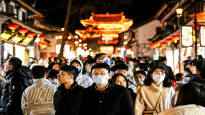DALI The alleys of Dal’s old town come alive at night. There is now a sea of people walking on them, impatiently waiting to get further away from home.
Hundreds of millions of Chinese are going on vacation for the first time in three years without fear of getting stuck on the way to quarantine.
The Chinese New Year holiday is the largest passenger flow in the world. This year, it is estimated that at least two billion trips will be made in the country.
In Dali, one of the country’s most popular tourist destinations in southwest China’s Yunnan province, one can see that the opportunity has been seized. The city attracts both families with children and youth groups.
In the alleys lined with buildings that are hundreds of years old, there are restaurants every few tens of meters. Live music reverberates from all of them. Troubadours interpret well-known Chinese songs.
Queues build up in front of the milk tea and kebab stalls. Grilled food sizzles on restaurant tables.
In the town of the Bai and Yi ethnic minorities, it is also a popular business to dress tourists in national costumes and take photos as souvenirs.
For the residents of Dal, the lifting of the corona restrictions is a long-awaited lifeline. 25 years old Tingting has rented a small shop on Kapupakatu. Yunnan nuts, mushrooms and other local health foods are on the shelves. He sells fresh orange juice he squeezes himself at a kiosk in front of the store.
– I had a shop before, but I closed it after the start of the covid pandemic. I went to a part-time job in a clothing store. Now I’m starting over again, he smiles.
– I hope for good sales this year, so that I can get back the income I lost in recent years, he hopes.
The number of tourists has already increased fivefold since last year
More than 300,000 tourists visited Dali during the first two weeks of January, when the travel restrictions were lifted in December.
That is five times the number of tourists compared to the same time last year. After the Chinese New Year, a much bigger traffic jam is expected. The travel season lasts 40 days.
On the edge of Dal, the artisans of Zhoucheng village await the influx of tourists.
– Up to a couple of thousand people visited our workshop a day before covid, recalls the craftsman Duan Hua’ai.
The 54-year-old master of knot dyeing says that the village, which lives on tourism, was starving under the corona restrictions.
– Before, we earned 1,500-2,700 euros per day from fabrics. In the Covid era, only a good tenth of that, he calculates.
Many artisans in the village dye fabrics at home. They are sold at the workshop, where tourists can try dyeing themselves. Over the course of three years, a lopsided pile of fabrics has accumulated, but no money has come.
Duan Hua’ai says that two thirds of the village’s ten thousand residents work in knot dyeing. It also employs the elderly.
– If this didn’t exist, the elderly would not be able to work or earn money. They make a living from this, he says.
Duan Hua’ai hopes the corona pandemic is over. The whole village has already had time to get sick of it.
– We stopped working in the middle of December, got sick and rested. Now it’s over and we went back to work, he says.
The family with children is already waiting to go on a trip abroad
A 38-year-old coder Cai knotting a white cotton bag with her children and husband in Duan’s workshop. The family was able to go on vacation away from Beijing for the first time in three years.
– The child’s school forbade travel. If we had left Beijing, we would have been quarantined before the child could return to school. We didn’t want to take a risk, says Cai.
Yunnan was attracted from winter Beijing by the gentle sun of the south. For the weekend, they head to their grandparents in Yangzhou city, Jiangsu province to spend Chinese New Year. A long-awaited trip to Southeast Asia looms in the future.
– We are so happy that we can travel again. I feel freedom in the air, Cai rejoices.
The corona pandemic has not yet been forgotten. The pandemic is still punishing the elderly and the weakest, who have become seriously ill. It is feared that Chinese New Year tourism will take the pandemic to remote villages where the elderly live but medical care is weak.
Cai is still cautious about the corona. Going on a trip abroad is not yet certain either, because the rules are still a bit unclear.
– There is still uncertainty regarding covid. We don’t know if the virus mutates. But the direction seems good, Cai says.
You can feel the relief on the streets of Dali. In the centuries-old city of Dali, the restaurant of the Yi minority has been crowded for a long time. The alleys at night are crowded like a sea of people. Many do not have a face mask.
– Before covid, our restaurant was really popular. Customers had to wait in line to eat, a 30-year-old waiter Wu remembers.
Twenty family members work in the restaurant, where at the start of dinner, a drinking song is always sung to the customers with rose and rice wine.
When the corona restrictions were lifted in December, the number of tourists slowly began to return. Now there is a queue in front of the restaurant again.
– I am very happy about the opening. I look forward to a bright future and an improvement in the economy, Wu thinks.
What thoughts does the news evoke in you? You can discuss the topic until 23:00 tomorrow.
